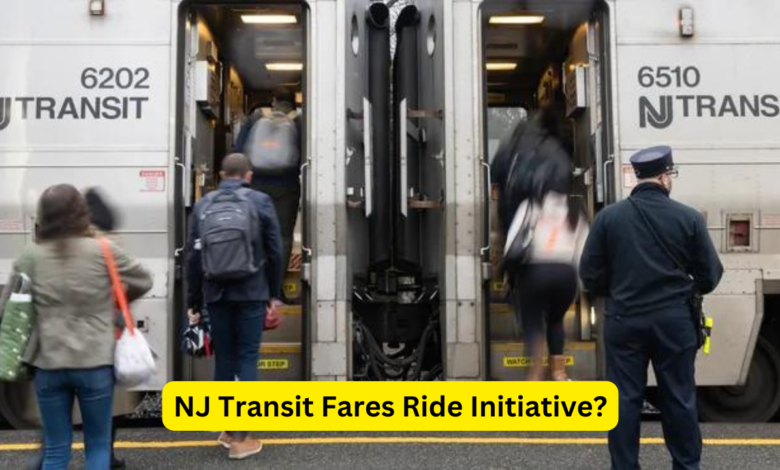NJ Transit Fares Ride Initiative?

NJ Transit Fares Ride Initiative, Governor Phil Murphy’s recent decision to offer free NJ Transit fares from August 26 to September 2, 2024, represents a pivotal move in response to the ongoing service disruptions affecting New Jersey’s public transportation system. This initiative aims to provide immediate relief to commuters who have faced considerable inconvenience due to recent delays and service interruptions. This article delves into the details of the free fare period, the background of NJ Transit’s service challenges, and the potential impact on both commuters and the transit system.
Overview of the Free Fare Announcement
Governor Murphy’s decision to suspend NJ Transit fares for one week is a direct reaction to the escalating issues faced by the transit system. The free fare period will span from August 26 to September 2, 2024, and will encompass all NJ Transit services, including trains, buses, and light rail. This initiative is designed to alleviate the financial burden on passengers who have been affected by recent disruptions.
Purpose of the Free Fare Initiative
The primary objective of this free fare initiative is to offer immediate relief to commuters who have been significantly impacted by delays and service disruptions. By eliminating fare costs for a week, the state government aims to ease the financial strain on passengers and restore some degree of normalcy to their daily travel routines.
Background on NJ Transit Service Disruptions
Recent Challenges Faced by NJ Transit
In recent months, NJ Transit has encountered a series of operational challenges that have led to widespread service disruptions. Key issues include:
- Mechanical Failures: Frequent breakdowns of trains and buses have resulted in extended delays and cancellations.
- Staffing Shortages: A shortage of qualified personnel has hindered the effective maintenance and operation of transit services.
- Infrastructure Problems: Aging infrastructure and insufficient maintenance have exacerbated service disruptions.
These challenges have collectively contributed to a decline in the reliability of NJ Transit services, prompting the need for the free fare initiative.
Impact of Service Disruptions
The ongoing service disruptions have had a profound impact on daily commuters. Delays and cancellations have caused significant inconvenience, affecting punctuality and overall travel experience. The free fare initiative is a temporary measure intended to address the immediate concerns of passengers while longer-term solutions are developed.
Details of the Free Fare Period
Dates and Duration
The free fare period will commence on August 26, 2024, and continue through September 2, 2024. During this time, all NJ Transit passengers will be able to use trains, buses, and light rail services without incurring any fare costs. This initiative aims to provide a week of free travel to help mitigate the effects of recent service disruptions.
Implementation of the Free Fare
To facilitate the free fare period, NJ Transit will implement several key changes:
- Ticketing System Adjustments: The standard fare collection systems will be temporarily deactivated to allow for free rides.
- Communication to Passengers: NJ Transit will utilize various communication channels, including social media, website updates, and direct notifications, to inform passengers about the free fare period and any service changes.
Impact on NJ Transit Passengers
Benefits to Commuters
The free fare initiative offers several immediate benefits to commuters:
- Cost Savings: Passengers will save money on their daily travel expenses during the free fare period.
- Reduced Financial Burden: The elimination of fare costs alleviates some of the financial strain caused by recent service disruptions.
Short-Term and Long-Term Effects
In the short term, the free fare initiative may lead to an increase in ridership as more people take advantage of the free services. This could potentially result in less crowded services during peak times. Long-term, the initiative may help to restore public confidence in NJ Transit as the organization addresses the underlying issues causing the delays.
Analysis of Recent Service Delays
Causes of the Delays
The recent delays experienced by NJ Transit can be attributed to several factors:
- Mechanical Failures: Frequent equipment malfunctions have disrupted service schedules.
- Staffing Shortages: The shortage of skilled personnel has affected the reliability of service operations.
- Infrastructure Problems: Outdated infrastructure and insufficient maintenance have contributed to the service issues.
Measures to Address the Issues
NJ Transit is taking several steps to address these challenges:
- Upgrading Equipment: Investments in new trains and buses are being made to replace outdated equipment.
- Hiring and Training Staff: Efforts are underway to recruit additional staff and provide necessary training to enhance service reliability.
- Infrastructure Improvements: Plans are in place to undertake essential repairs and upgrades to infrastructure to improve overall service quality.
Commuter Reactions and Feedback
Public Opinion on the Free Fare Initiative
The announcement of the free fare period has garnered mixed reactions from the public. While many commuters appreciate the gesture, some express skepticism about its effectiveness in resolving the underlying issues. Feedback from passengers emphasizes the need for comprehensive, long-term solutions to address the root causes of the service disruptions.
Stories from Affected Commuters
Several commuters have shared their personal experiences regarding the recent delays and the impact on their daily routines. These stories highlight the significance of both immediate relief measures and sustained efforts to address systemic problems within NJ Transit.
Comparing NJ Transit to Other Transit Systems
Regional Transit Comparisons
When compared to other major transit systems in the region, NJ Transit faces unique challenges. However, many similar systems have successfully implemented strategies to enhance service reliability and improve passenger satisfaction.
Lessons Learned from Other Systems
Examining the approaches taken by other transit systems provides valuable insights for NJ Transit. Successful strategies from other regions, such as adopting advanced technologies and improving infrastructure, may serve as models for enhancing NJ Transit services and restoring commuter trust.
Future Plans for NJ Transit
Upcoming Improvements and Upgrades
NJ Transit has outlined several plans to improve service reliability and passenger experience:
- Investment in Technology: Adoption of advanced technologies to streamline operations and enhance communication with passengers.
- Customer Service Enhancements: Improvements in customer service and support to address passenger concerns more effectively.
- Long-Term Strategic Goals: Development of a comprehensive strategy to tackle systemic issues and ensure sustainable improvements.
Ongoing Challenges and Solutions
Despite ongoing efforts, NJ Transit will continue to face challenges. Addressing these issues requires sustained commitment and collaboration among government officials, transit authorities, and the community.
Conclusion
Governor Phil Murphy’s initiative to offer free NJ Transit fares from August 26 to September 2, 2024, represents a significant step in addressing recent service disruptions. While this temporary measure provides immediate relief to commuters, it also highlights the need for long-term improvements to ensure a reliable and efficient transit system. As NJ Transit works to overcome its challenges, continued support and patience from passengers will be essential in achieving a more dependable transit experience.
For additional resources and information about NJ Transit, you can visit the NJ Transit official website and explore updates on service changes and improvements.





One Comment